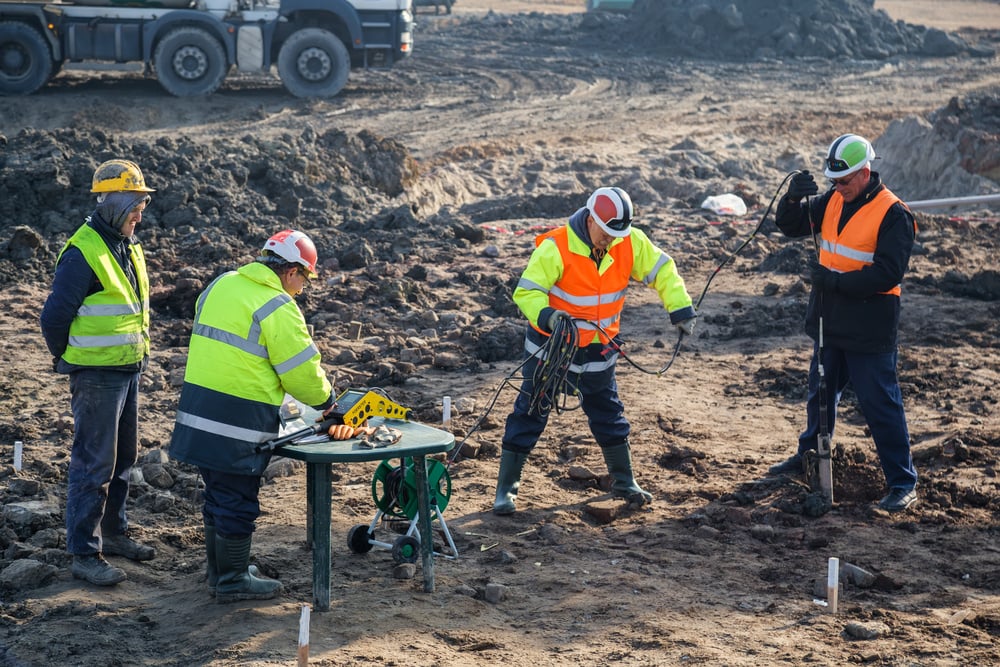Specialized Geotechnical Engineering Solutions for Dummies
Specialized Geotechnical Engineering Solutions for Dummies
Blog Article
6 Simple Techniques For Specialized Geotechnical Engineering Solutions
Table of ContentsThe Main Principles Of Specialized Geotechnical Engineering Solutions The Best Strategy To Use For Specialized Geotechnical Engineering SolutionsThe 9-Second Trick For Specialized Geotechnical Engineering SolutionsHow Specialized Geotechnical Engineering Solutions can Save You Time, Stress, and Money.
They perform website examinations, collect samples, do laboratory tests, and examine information to evaluate the suitability of the ground for building and construction tasks. Based on their findings, geotechnical engineers supply recommendations for structure design, slope stability, maintaining frameworks, and reduction of geotechnical hazards. They work together with other experts, such as engineers, architectural designers, and construction teams, to guarantee that geotechnical considerations are integrated right into the general task layout and execution.
Foundation Style: Geotechnical designers play a critical role in developing structures that can securely sustain the desired framework. They analyze the dirt conditions and tons demands to establish the appropriate foundation type, such as shallow foundations (e.g., grounds), deep structures (e.g., heaps), or specialized techniques like dirt improvement. They consider factors such as settlement limits, bearing ability, and soil-structure communication to create optimum structure layouts.
Not known Details About Specialized Geotechnical Engineering Solutions
Below are some kinds of geotechnical engineers: Foundation Designer: Foundation engineers concentrate on creating and evaluating foundations for structures - Specialized Geotechnical Engineering Solutions. They examine the soil problems, load needs, and site qualities to establish the most suitable foundation type and style, such as shallow structures, deep foundations, or specialized strategies like stack structures
They do field screening, collect examples, and analyze the gathered data to define the dirt properties, geologic formations, and groundwater problems at a site. Geotechnical Instrumentation Designer: Geotechnical instrumentation designers concentrate on surveillance and measuring the actions of soil, rock, and structures. They mount and maintain instrumentation systems that keep an eye on factors such as soil negotiation, groundwater levels, slope activities, and structural displacements to examine efficiency and supply early cautions of potential problems.
In the workplace setting, geotechnical engineers use specialized software program tools to do estimations, create styles, and examine information. Specialized Geotechnical Engineering Solutions. They prepare reports, review job requirements, connect with clients and employee, and coordinate job tasks. The workplace setup provides a favorable atmosphere for study, evaluation, and collaboration with other professionals associated with the job
They regularly see project sites to conduct site investigations, evaluate geotechnical conditions, and gather data for analysis. These sees include taking a trip to various places, occasionally in remote or challenging surfaces. Geotechnical designers might do soil sampling, conduct tests, and monitor construction tasks to ensure that the geotechnical aspects of the project are being implemented properly.
Specialized Geotechnical Engineering Solutions for Dummies
Geotechnical designers likewise function in specialized geotechnical labs. In these facilities, they perform experiments, do tests on dirt and rock samples, and assess the engineering residential properties of the materials. Geotechnical research laboratory engineers function extensively in these settings, managing testing devices, operating tools, and recording information. They collaborate with various other laboratory personnel to ensure precise and reputable screening results.
Retaining Walls: Producing wall surfaces that hold back soil to stop landslides and give security on sloped surfaces. Embankments and Earthworks: Creating embankments for roadways, trains, and dams to ensure they stay stable under stress and anxiety. The mining sector counts greatly on geotechnical engineering to ensure the safety and longevity of its operations.
With this in mind, we have actually made our program to prepare trainees for success. Geotechnical designers are involved in all phases of the design of structures, from idea to building and construction. Their job is vital in the layout and planning process as they check this evaluate the honesty of soil, clay, silt, sand, and rock, prior to building commencing.
The Only Guide to Specialized Geotechnical Engineering Solutions
This is followed by a ground investigation based on the findings of the desk study and entails test matching and sampling to uncover any kind of prospective issues. Geotechnical designers function within multidisciplinary groups, sustained by intermediate and younger designers along with by CAD professionals. As a senior geotechnical designer on a hydro plant task, tasks might consist of getting involved in technical reviews (e.g., peer reviews), tailings clog examinations, dam security reviews, and various other researches connected to the design and construction of mine waste facilities.
While some professionals specialise only in geotechnics, others may work under titles like engineering geologist or ground engineer within similar capacities. As a geotechnical engineer, you'll need to: build and maintain relationships with clients and other specialists associated with the website, throughout each projectmaintain safety and security criteria on website be conscious of price effects when you make recommendationsstudy geological maps and airborne photos from a series of resources and from various time periodsexamine building and construction plans to see how possible they are based on your understanding of the siteinvestigate risks or geological hazards for the sitesearch for news eco delicate functions, such as garbage dump start to develop valid and expository ground modelsplan field investigationsdrill and analyse examples of bedrock, dirt, groundwater and extra materials manage various other experts on sitesolve technical issues as they develop, such my company as unforeseen structures at drill sitesmonitor problems during and after construction to make certain frameworks are stable in the brief and lengthy termadd data accumulated on site to your initial researchcreate geotechnical estimations, drawings, and two or three-dimensional computer system models analyzing the datamake suggestions about the suggested usage of the website.
There are great deals of possibilities to satisfy brand-new people, as you'll deal with a variety of professionals at every website. The work can be difficult as you may be in charge of the safety of others while on website. There is also a high degree of financial obligation, as the recommendations you make can have severe cost ramifications.
Report this page